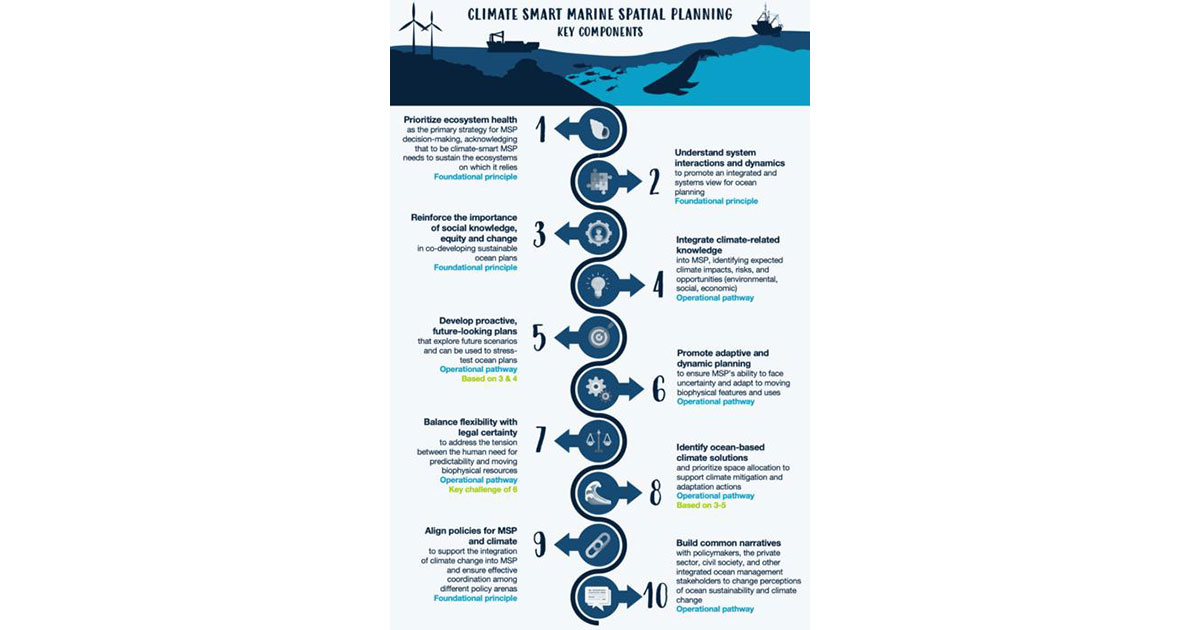New study identifies ten key components that will promote the development and implementation of sustainable, equitable, climate-smart ocean planning initiatives around the globe.
In a paper published in npj Ocean Sustainability, the researchers outlined guidelines to support marine managers and planners on how to develop climate-smart ocean plans and put them into action. Led by Catarina Frazão Santos, researcher and professor at the Faculty of Sciences of the University of Lisbon (Ciências ULisboa) and honorary research associate at the University of Oxford, the team included scientists and practitioners from both academia and international organizations, from Portugal, United States, Australia, Italy, Canada, Chile, South Africa, Brazil, and the United Kingdom.
The guidelines come at a critical time as UNESCO and the European Commission jointly launched a global marine spatial planning roadmap identifying climate-smart marine spatial planning as a key priority area for 2022–2027—a need also highlighted by several other institutions, like the World Bank or the United Nations Global Compact. However, at a practical level, decision-makers and practitioners greatly need guidance on how to act.
“While marine spatial planning is being developed in over 75 countries all around the globe, to date no ocean plan has integrated climate change comprehensively,” says Catarina Frazão Santos. “With this Perspective, we aim to address this challenge and provide solutions to moving forward. The components are also intended to provide a checklist to support the assessment and monitoring of the level of ‘climate-smartness’ of existing and future marine spatial planning initiatives.”
Operational pathways and foundational principles
The proposed ten key components include foundational principles—underpinning the entire planning process—and operational pathways—practical channels to action. All are deeply interrelated and believed to function best as a coherent whole. However, the authors recognize that as components are context-dependent—that is, influenced by social, economic, political, and environmental factors—in some cases some will be more prevalent than others.
Proposed operational pathways to developing climate-smart marine spatial planning ranged from integrating climate-related knowledge, to developing proactive future-looking plans, promoting adaptive and flexible planning, balancing flexibility with legal certainty, identifying ocean-based climate solutions, and building common narratives together with policymakers, the private sector, civil society, and other integrated ocean management stakeholders, to change perceptions of ocean sustainability and climate change.
At the same time, the authors advocate that several foundational principles are needed to unlock and support action. These relate to prioritizing ecosystem health as the primary strategy for marine spatial planning decision-making, understanding system interactions and dynamics to promote an integrated and systems view for ocean planning, reinforcing the importance of social knowledge, equity and change in co-developing sustainable ocean plans, and aligning marine spatial planning and climate policies to support the integration of climate change into marine spatial planning and ensure effective coordination among different policy arenas.
“We aim to foster further debate and advance a highly relevant topic for the future of our ocean,” says Catarina Frazão Santo. “The piece also comes at an important time as the marine spatial planning global initiative, by UNESCO and the European Commission, is expected to develop a guide on climate-smart marine spatial planning by late 2024.”



